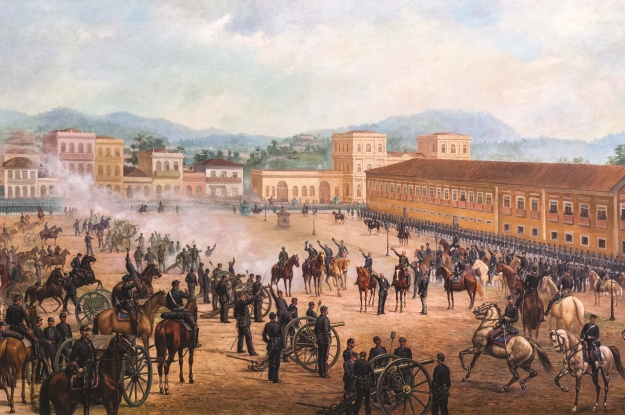“A tree born crooked will never straighten itself out.”
The aphorism is a favorite among Brazilians seeking to explain their nation’s frustrating lack of steady and inclusive socioeconomic progress. In Inglorious Revolution (Yale University Press), William Summerhill digs down to expose some of the roots.
This meticulously researched academic work sets out to explain why Brazil’s broader financial system failed to thrive despite the nation’s success in building credibility as a trustworthy borrower following independence from Portugal.
While obscure at first glance, the topic will resonate with observers of Brazil’s current economic reality.
As Summerhill shows, preferential treatment for government cronies and massive barriers to entry for entrepreneurs have been part of the Brazilian way from the very start. Today’s high interest rates, scarce long-term credit, and concentrated wealth are just part of an ongoing legacy.
Of course, it didn’t have to be that way. Brazil’s government began tending very carefully to its financial obligations after independence. In a region where political turbulence and war triggered numerous defaults, Brazil was an island of prudence, successfully raising money abroad and at home while faithfully honoring its debts even during periods of financial difficulty.
That makes sense, considering Brazil’s government was controlled by its creditors.
The constitution of 1824 gave veto authority over financial policy to parliament, made up mostly of the enfranchised elite – many of whom were major bondholders. The interests of the state, therefore, were their interests, which helped keep lending and spending in check.
While that fostered stability, it also stifled broader financial development. Government, in the hands of the wealthy, restricted the formation of new corporations and financial institutions in order to keep competition to a minimum. At the same time, limiting access to new investment opportunities helped the government fuel demand for its domestic bonds.
A politically connected elite tapping government institutions for favorable treatment to the detriment of free competition. Sound familiar?
While not his intention, Summerhill’s research suggests that some aspects of Brazilian society have remained in place for nearly 200 years. The Brazil of today, where treasury funds subsidized loans to “chosen” companies through the state development bank, where tax policy strangles competitiveness, and where opening a business is an exercise in bureaucratic futility, is an echo of nation’s past.
“Had Brazil achieved financial development commensurate with its success as a sovereign borrower, the gap in income and productivity between it and more economically advanced nations would have been reduced, perhaps considerably so,” Summerhill writes.
The constitutional monarchy was overthrown in 1889, followed by a loosening of restrictions on corporations and bank charters. That produced a bubble, given the pent-up demand for incorporation, leading to a market crash soon after.
Declining coffee prices, fiscal deficits, and high inflation with a deteriorating currency eventually drove Brazil to a default in 1898.
The nation’s credibility was hammered throughout the following century by subsequent defaults and crises. A short period of rapid economic growth in the late 2000s and the elevation of Brazil’s sovereign credit rating to investment grade was supposed to herald a return to stability, but that also turned out to be fleeting.
“The consequences of the fall from grace linger in the present,” Summerhill concluded. Indeed, without a change in the way Brazil does business, the tree will continue to grow crookedly – and very slowly at that.
—
Levine is managing director of JeffreyGroup, a Latin America–focused communications consultancy. From 2011 to 2015 he reported on Brazil’s economy as a São Paulo–based correspondent with Reuters. He holds a master’s degree in Latin American studies from Columbia University, where he focused on Brazil’s economic development.



